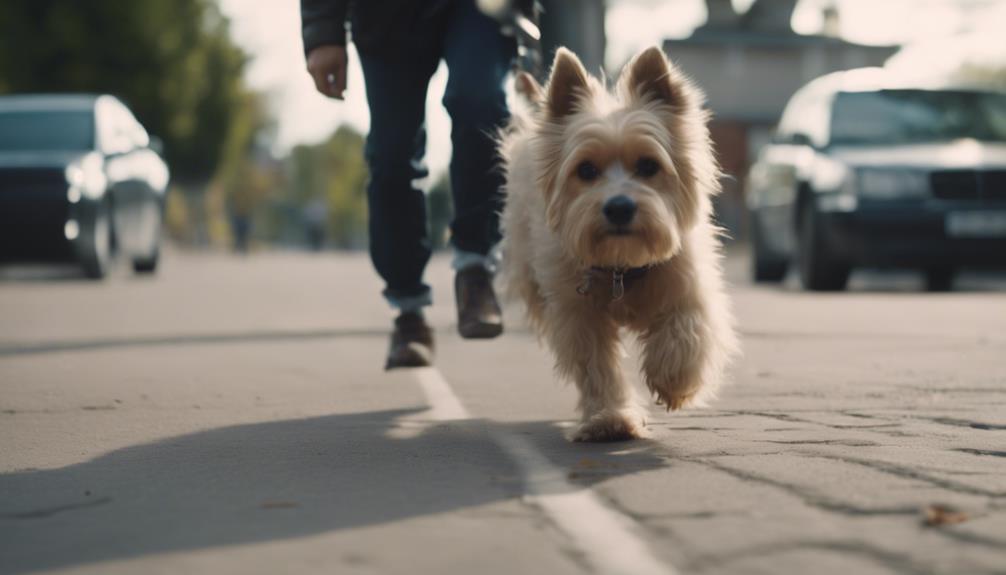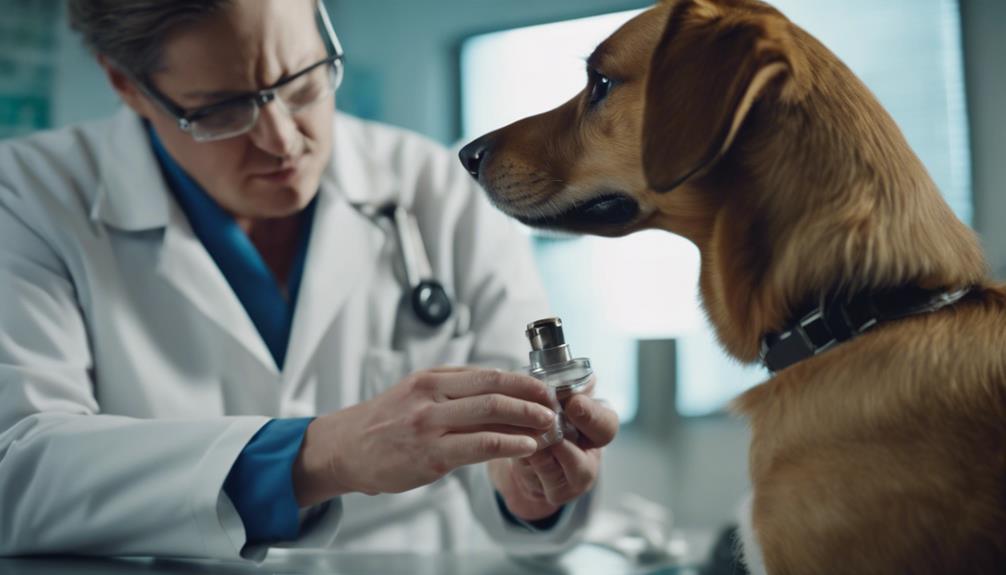Understanding the reasons behind why your dog scoots can provide valuable insights into their health and well-being. Anal glands play a significant role in this behavior, yet their function is often misunderstood or overlooked by pet owners.
By uncovering the mysteries surrounding these glands, we can decipher the signals our furry friends are trying to communicate and address any potential issues effectively.
Stay tuned to uncover the secrets of your dog's scooting behavior and gain a deeper understanding of what you need to know about their anal glands.
Key Takeaways
- Understanding why your dog scoots involves recognizing potential anal gland issues.
- Knowing the functions of anal glands is crucial for comprehending your dog's behavior.
- Recognizing signs of anal gland problems helps in timely veterinary intervention.
- Preventing anal gland complications requires proactive care, diet, exercise, and veterinary consultation.
Understanding Anal Glands in Dogs
Located near a dog's anus, anal glands are small pockets that play a vital role in communication and scent marking. These glands secrete an odorous fluid that is used by dogs to mark their territory and convey information to other animals. The scent released from these glands can vary in intensity based on factors such as fear or excitement.
Additionally, the fluid produced by anal glands is also responsible for giving a dog's stool its distinctive smell. Understanding the anatomy and function of anal glands is crucial for recognizing potential issues that may arise, such as swelling, impaction, infections, or ruptures. Regular monitoring and appropriate care can help maintain the health and functionality of a dog's anal glands.
Functions of Anal Glands
Playing a crucial role in canine communication, anal glands in dogs serve as essential scent markers in their social interactions. These small sacs, located near the anus, produce a distinct odorous fluid that is used by dogs to mark territory, identify each other, and convey information about their age, sex, health, and emotional state.
When a dog defecates, the fluid from the anal glands is released along with the feces, creating a unique scent that is specific to each individual. This scent helps dogs establish boundaries, establish hierarchies, and communicate important information within their social groups.
Understanding the functions of anal glands sheds light on their significance in the intricate world of canine communication and behavior.
Common Anal Gland Issues
Anal gland issues are prevalent among dogs and can lead to discomfort and complications if not addressed promptly by a veterinarian. These problems commonly include swelling due to improper emptying, impaction from overfilling, infections that can lead to abscesses, and the risk of rupture, which can result in messy situations.
These issues may affect one or both anal glands, causing pain and distress to the dog. It is crucial for pet owners to be aware of these potential problems and seek veterinary attention if they suspect any anal gland issues in their furry companions. Regular check-ups and proper care can help prevent these issues from escalating and ensure the well-being of the dog.
Signs of Anal Gland Problems
Detection of anal gland problems in dogs requires keen observation of subtle behavioral and physical cues exhibited by the canine. Signs of anal gland issues may include:
- scooting,
- excessive licking of the anus,
- a strong, unpleasant odor emanating from the area.
Redness, swelling, and straining during defecation could also indicate potential problems with the anal glands. In more severe cases, a dog may cry or show signs of discomfort, along with the presence of blood, pus, or unusual drainage.
Additionally, the observation of materials left behind in resting areas, such as fecal matter or secretions, can serve as valuable indicators of anal gland complications. It is crucial for pet owners to promptly address these signs by seeking veterinary care for proper diagnosis and treatment.
Causes of Anal Gland Complications
Observing the behavior and health indicators of dogs can provide crucial insights into the underlying causes of anal gland complications.
Several factors can contribute to issues with a dog's anal glands, including:
- Diet lacking in fiber.
- Excessive gland production.
- Underlying medical conditions.
- Breed predispositions.
These causes can lead to complications such as impaction, infections, and abscesses. Understanding these potential causes is essential for proactive management and prevention of anal gland problems in dogs.
Risk Factors for Anal Gland Issues
What factors contribute to the development of anal gland issues in dogs? Anal gland issues in dogs can arise from various risk factors that increase the likelihood of complications. These factors include:
| Risk Factors | Description |
|---|---|
| Diarrhea | Soft stools may not provide enough pressure for gland emptying. |
| Constipation | Hard stools can lead to inadequate emptying of the glands. |
| Obesity | Excess weight can put pressure on the glands, affecting their function. |
| Skin Infections | Inflammation in the surrounding area can impact gland health. |
Recognizing Symptoms Early

Early identification of symptoms indicating potential anal gland issues in dogs is crucial for prompt intervention and management. Recognizing these signs early can help prevent complications and discomfort for your furry friend. Here are some key symptoms to watch out for:
- Scooting or dragging their bottom along the ground.
- Excessive licking or biting around the anal area.
- Foul odor emanating from the rear.
- Swelling, redness, or discharge near the anus.
If you notice any of these signs in your dog, it is essential to consult with a veterinarian for proper evaluation and treatment. Timely attention to these symptoms can help address anal gland issues effectively and ensure your dog's well-being.
Importance of Veterinary Visits
Regular veterinary visits play a crucial role in maintaining the overall health and well-being of your dog, including the management of anal gland issues. A veterinarian can conduct thorough examinations to detect any anal gland problems early on, preventing complications such as infections or abscesses. During these visits, your vet can also advise on proper anal gland care, including regular expressions if necessary.
Additionally, they can address any underlying issues like allergies or obesity that may contribute to anal gland difficulties. By establishing a routine schedule of veterinary check-ups, you can ensure that your dog's anal glands are healthy and functioning properly, promoting their comfort and preventing more serious complications down the line.
Treatment Options for Anal Glands

When addressing anal gland issues in dogs, treatment options typically involve manual expression by a veterinarian, administration of antibiotics, or in severe cases, surgical intervention may be necessary.
- Manual Expression:
- Done by a veterinarian to manually empty the glands.
- Can be uncomfortable for the dog but is effective.
- Antibiotics:
- Prescribed to treat infections or abscesses.
- Helps reduce inflammation and clear up any bacterial issues.
These treatment options aim to alleviate discomfort, resolve infections, and prevent further complications associated with anal gland issues.
It's essential to consult a veterinarian for proper diagnosis and tailored treatment plans based on the specific needs of your dog.
Preventive Care for Anal Glands
To maintain optimal anal gland health in dogs, implementing a consistent preventive care routine is essential. Regularly monitoring your dog's anal glands is crucial in preventing issues such as impaction, infection, or abscesses.
A balanced diet with adequate fiber content can promote healthy bowel movements, aiding in natural gland expression. Additionally, ensuring your dog maintains a healthy weight and stays active can help prevent anal gland problems associated with obesity.
Regular vet check-ups can help catch any potential issues early on. It is also beneficial to provide your dog with appropriate toys and activities to prevent stress-induced gland expression.
Expressing Anal Glands at Home
Maintaining your dog's anal gland health can involve learning how to properly express the anal glands at home to address any potential issues efficiently. Here are some key points to consider:
- Consult Your Vet: Before attempting to express the anal glands at home, consult your veterinarian for guidance and instructions.
- Proper Technique: Learn the correct technique for expressing anal glands to avoid causing discomfort or injury to your dog.
- Use Caution: Be gentle and cautious when expressing anal glands to prevent any potential complications or infections.
- Regular Monitoring: Keep a regular schedule for checking and expressing your dog's anal glands to prevent issues from arising.
Ensuring Anal Gland Health
Proper care and attention to your dog's anal glands is essential for maintaining their overall health and well-being. Regular monitoring of your dog's anal glands can help prevent potential issues such as impaction, infections, or abscesses.
Ensuring your dog has a balanced diet with adequate fiber can promote healthy bowel movements, reducing the risk of anal gland problems. Additionally, providing your dog with regular exercise can help regulate their digestive system, aiding in the natural emptying of the anal glands.
If you notice any signs of discomfort or abnormal behavior related to your dog's anal glands, it is important to consult a veterinarian promptly for proper evaluation and treatment. By prioritizing your dog's anal gland health, you can contribute to their overall comfort and quality of life.
Conclusion
In conclusion, understanding the anatomy and function of anal glands in dogs is essential for responsible pet ownership.
By recognizing the signs, causes, and management of anal gland issues, dog owners can proactively care for their pets' health and well-being.
By implementing preventive measures and knowing how to address complications, owners can ensure the comfort and happiness of their canine companions.
Stay informed and attentive to your dog's anal gland health to maintain their overall wellness.




